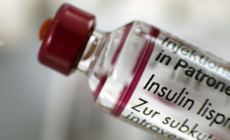-
Musk Is ‘President-Elect’ After He Helped Tank Spending Plan: David Axelrod - 25 mins ago
-
F.B.I. Searches Home of L.A. Deputy Mayor Suspected of Bomb Threat Against City Hall - 27 mins ago
-
County will pay $7.5 million settlement to girls sexually abused by sheriff’s deputy - 45 mins ago
-
Falcons QB Michael Penix Jr. Shares Hilarious Place He Heard Starter News - about 1 hour ago
-
The Rev. James Callan, Renegade Catholic Priest, Dies at 77 - about 1 hour ago
-
More L.A. cats appear to be infected with H5N1 bird flu - about 1 hour ago
-
How to Watch Cal vs UNLV, Live Stream LA Bowl, TV Channel - 2 hours ago
-
Temporarily Disconnected From Politics? Feel No Guilt About It. - 2 hours ago
-
UnitedHealthcare Sued by Dozens of Schools Over Price of Insulin - 2 hours ago
-
The Case for Throwing Stones From a Glass House - 3 hours ago
Drinking Water Warning: Wisconsin Residents Notified of Contaminated Supply
Hundreds of residents in Whitefish Bay, Wisconsin, have opened their mail to find a notification that their water service pipes may contain lead.
This is due to new Environmental Protection Agency (EPA) rules that require water utilities to alert residents about possible lead or other harmful materials in their service lines.
Around 75 percent of Whitefish Bay residents received these letters, according to Fox 6 Milwaukee, which explained that the material in their water lines may contain lead and when those lines might be replaced.
The letters came alongside an update posted on the Whitefish Bay village website posted on November 11.
“The Village of Whitefish Bay is committed to replacing all lead service lines in compliance with federal regulations,” the update said.
“Although we are currently ineligible for federal grant funding, which is being targeted at disadvantaged communities, we will continue to work to identify the best financing options possible to fund the replacement of all lead service lines over the next decade.”

naumoid/Getty
The letter and update warned residents that “exposure to lead in drinking water can cause serious health effects in all age groups,” including decreases in infant IQ and attention span, as well as risks of heart disease, high blood pressure, kidney and nervous systems problems in adults.
“The children of women who are exposed to lead before or during pregnancy can have increased risk of these negative health effects,” the update said.
While the village has already begun replacing lead services, it warned that replacing the entirety of the service pipes could take a decade or more.
What’s more, the private side of the lines which lie on the homeowners’ properties are the residents’ responsibility to replace. Whitefish Bay authorities estimate this could cost around $8,000 dollars per line.
Newsweek has contacted the Whitefish Bay authorities for via email for comment.
“However, this is just an estimate. More information will be available in the next year as we develop a full replacement plan,” the update said.
Residents are advised to contact their insurance company to learn about potential solutions and to notify Whitefish Bay Village authorities if a replacement is carried out.
“It’s not my fault that it’s lead pipes, I just bought the house,” Whitefish Bay resident Lee Van Dehy told local news outlet CBS58. “But they did the best that they could at the time, and they are still providing us with running water (…) so it’s unfortunate, let’s work together and make this happen.”
The EPA is requiring this work across the U.S. to start in 2027, but in the meantime, residents have been advised to use filters, flush their water, and eat a healthy diet to counteract any potential lead exposure.
The village has scheduled a meeting on December 2 to answer more questions about the costs, water testing, and the timeline for the replacement work.
This issue is not isolated to Whitefish Bay, as residents in neighboring communities like West Allis and Wauwatosa have also recently received similar notifications.
It is a widespread concern stemming from the EPA’s new lead and copper rule revisions that mandate the replacement of all service lines across the country over the next decade.
Do you have a tip on a science story that Newsweek should be covering? Do you have a question about drinking water? Let us know via science@newsweek.com.
Source link


















